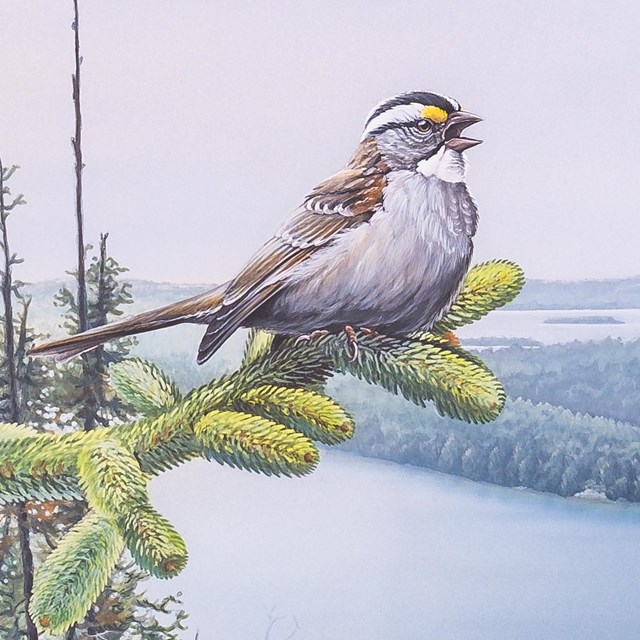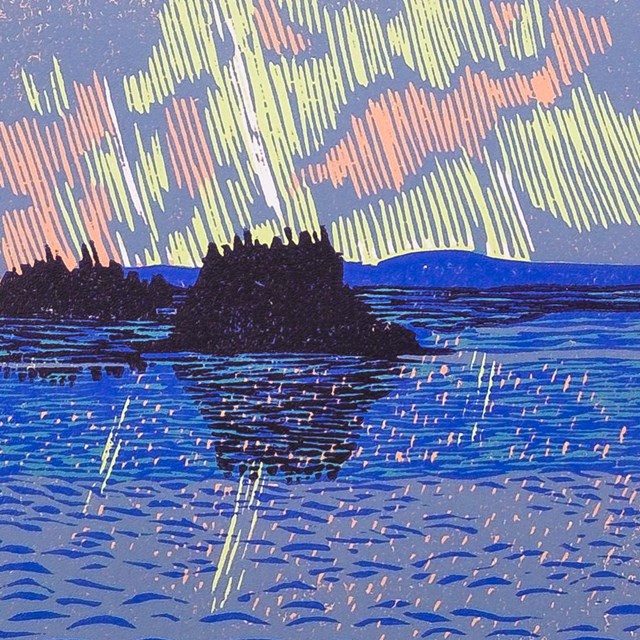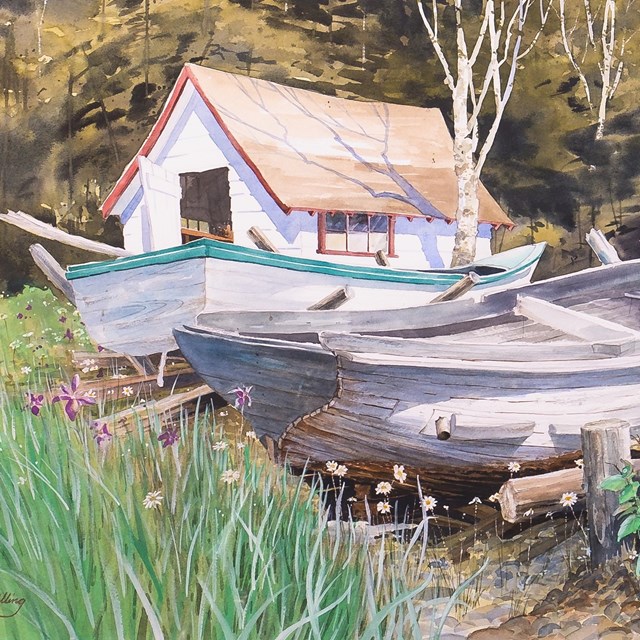Right now, somewhere on the largest island in the largest freshwater lake in the world, there is exactly one lone she-wolf prowling her way through the long northwoods night. Isle Royale National Park, or Minong as the Northern Ojibwe who first canoed to this rocky world of spirits called it, lies off the shores of Lake Superior the Great & Terrible, the shared 1,000 feet-deep mass of water connecting Minnesota, Wisconsin, Michigan and the Canadian shores. Lined with shipwrecks and 300 smaller islands, and riddled with abandoned mines and fisheries, Isle Royale simply was too remote to be profitable to early-industrial America, so as a last resort the island was made a national park in 1940. How remote? As Rev. George Grant said in 1872, “Those who have never seen Superior get an inadequate idea by hearing it spoken of as a lake; Superior is a sea. It breeds storms and rain and fog like a sea; it is cold, masterful & dreaded”. The island is only accessible by boat or float plane, and the journey can be treacherous; this November, in a display of fierce power unlike any storm in local history, trackers recorded twenty-eight foot waves on the shores in the Upper Peninsula, and at least two hikers were hurled away to their deaths on the craggy cliffs while hurricane force winds pummeled the coastline.
It’s here in this isolated wilderness where the fate of the last Isle Royale wolf is unfolding, a microcosm of our own dwindling capacity for true intimacy with the natural world. For three weeks in September of 2017, I was the Artist-In-Residence at Isle Royale National Park, a little-known but brilliant program administered by the Park Service to foster the connections between solitude, wilderness, and art; three vital respites that share much in common, but perhaps nothing quite so much as the quality of being endangered. Hermited away on the greenstone shores, I filtered drinking water from the mighty lake, fended off cold with nightly fires, gazed at shooting stars and slow moving freighters, and worked on songwriting for ten hours a day. For three weeks spoke nary a word to another human. In this extreme solitude well beyond cell-range and internet, I began to see Isle Royale and places like it as a nexus of the political, environmental, psychological & spiritual upheaval of our shaky times.
The Isle Royale wolves, like so many vulnerable species in the hot grip of changing climate, have been unable to adapt to a warming planet, and specifically to the warming waters of Lake Superior. The absence of an ice crossing from the mainland has prevented new wolves from replenishing an isolated gene-pool, facilitating the explosion of the moose population, upwards of 1,600 animals on the island in 2016. In March, the National Park Service proposed a plan to bring thirty new wolves to the island in an effort to repopulate this collapsed population, a bold move unprecedented in a park that has avoided overt human intervention for decades. Opponents say to let nature take its course here and do nothing, but devoted researchers like Michigan Tech’s Rolf Peterson and his wife Candy understand that human activity has already altered this ecosystem inextricably, and that questions of interference are very late in coming. Together with volunteers they have tirelessly documented these changes first-hand, witnesses to the imbalance in this predator-prey relationship, and my conversations with them made clear a fundamental question regarding our wild places: as we ponder what we stand to lose by further despoiling of wilderness, what it is we have already lost that has led us to this and other scenarios of ecological collapse coast to coast and around the globe?
When Donald Trump & his tycoon henchmen first began their bungling and dangerous wresting away of safeguards and regulations aimed at protecting America’s most vulnerable places, many were surprised to find the National Park Service (specifically their “Alt”corollary) to be one of the first voices of dissent. However, it should come as no surprise; that same strain of resistance and conservation which has inspired Native protests all across Indian Country from Standing Rock to Bears Ears is alive and well in those who have dedicated their lives to our national parks. Together and with others in the movement, their refrain rings out a simple but potent message: the way we treat our land is the way we treat our people, period. An attitude of conservation and stewardship doesn’t stop at the pipeline or the open-pit mine; it translates directly to the care, dignity and respect we offer our citizens, families, and tribes, especially our most vulnerable. The National Park Service, and the generations-longer Native resistance share this message in common, for they have always been in the protection business. But what they also remind us is while costly storms and dangerous weather trends affect us materially, the struggle and imminent loss we face is as much spiritual as it is physical.
We go to the woods to be lost, and it is our lostness that saves us. Nietzsche said “We are so fond of being out in nature because it has no opinion of us”; what a precious commodity indeed. Spinning in our loops of instant feedback and validation-hunting online, and with a president whose infantile need for praise threatens our very democracy, the non-virtual reality of wild places annihilates the ego with redemptive indifference. No such thing as fake news in a lightning storm; no authority to consult regarding its urgency or presence. The silent void of a star-filled sky doesn’t register your opinion, and no Instagram photo can improve upon it. A river is not just a river; it is a counterpoint to narcissism, and as the late nature-loving author Jim Harrison said, you can’t step into the same one even once. Going and staying in wild places unscrambles our shell-shocked nervous systems with effortless grace. We go and sit very still in some quiet place until the natural world begins to re-take its shape around you. The advantages of not seeing the news, social media, Trump’s tweet-fits and world-wide crises in real-time is like stepping two inches off a railroad track; at least for a moment, the whole carnival of emergency lumbers on by you. In the dense underbrush away from the tracks there are natural rhythms, antidotes to android notifications. In wilderness we face the world alone with a humble lack of defense; you begin to see precisely what is the work of your life, what places need your attention. A grizzly bear generally needs 1,000 miles of range to roam; I would say the same is true of our minds. Like the last Isle Royale wolf, we go looking for connection, but the world we’ve created makes it harder and harder to find. We’re like mountain lions chasing laser pointers, but we belong at large.
And so it goes, the enduring battle with what the late American Indian activist and poet John Trudell called “the industrial ruling-class” of this planet to preserve space, both physical & spiritual, for the people and creatures of Earth. Every screen in your vicinity screams at you all day long that something is wrong with you and to make yourself more useful. A very fair response is “To whom, or what, exactly?” We suffer not from a lack of information but a lack of perspective, and we must put our own oxygen masks on before assisting other travelers. So we go to the woods. We must go to the woods to remember how to be lost, to fall in love with slow questions over fast answers. Or as the great Japanese mountain poet-monk Ikkyu put it, “We’re lost, utterly lost where the mind cannot find us”. There are now fewer and fewer places to get this important job done. These places, and the people and animals that rely upon their resources to survive, are worthy of protecting as if our lives depended on it. They do, in fact.
- David Huckfelt, 2019
Return to David's Page
Return to the Artist-in-Residence Exhibit



